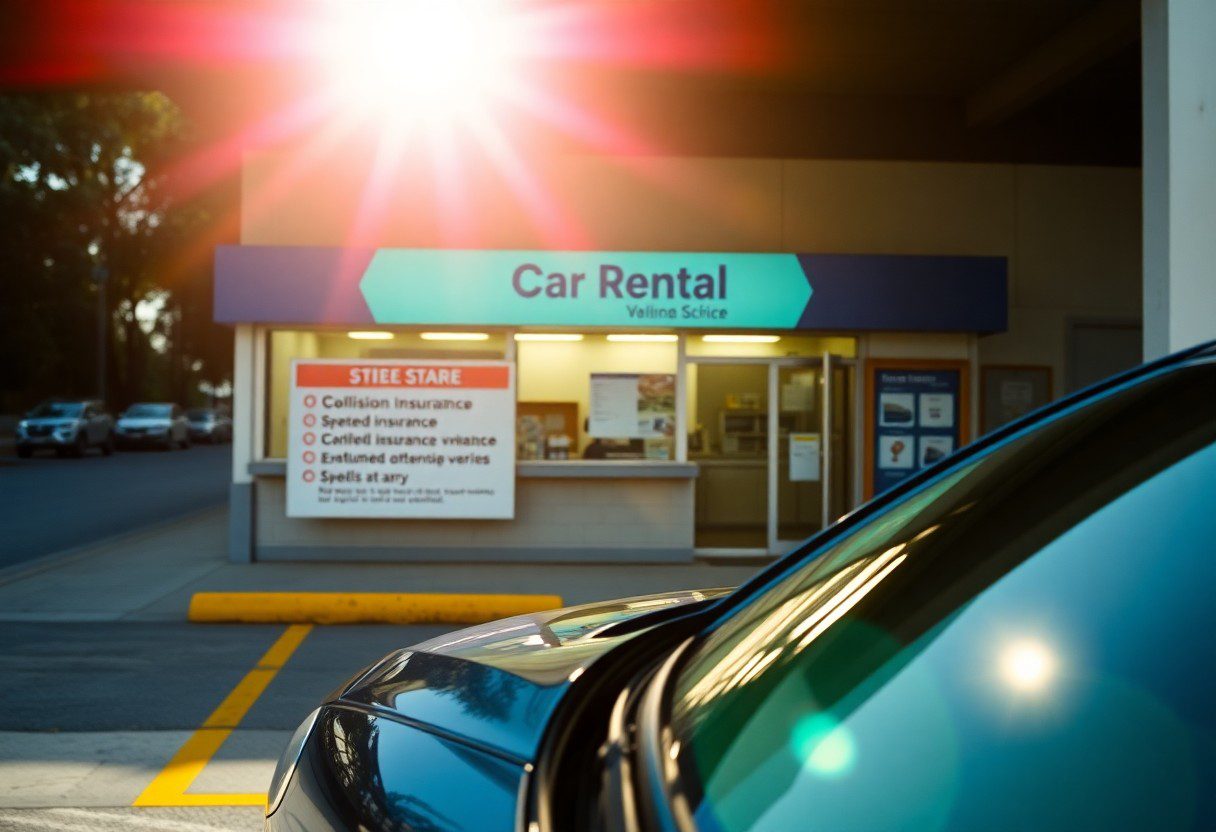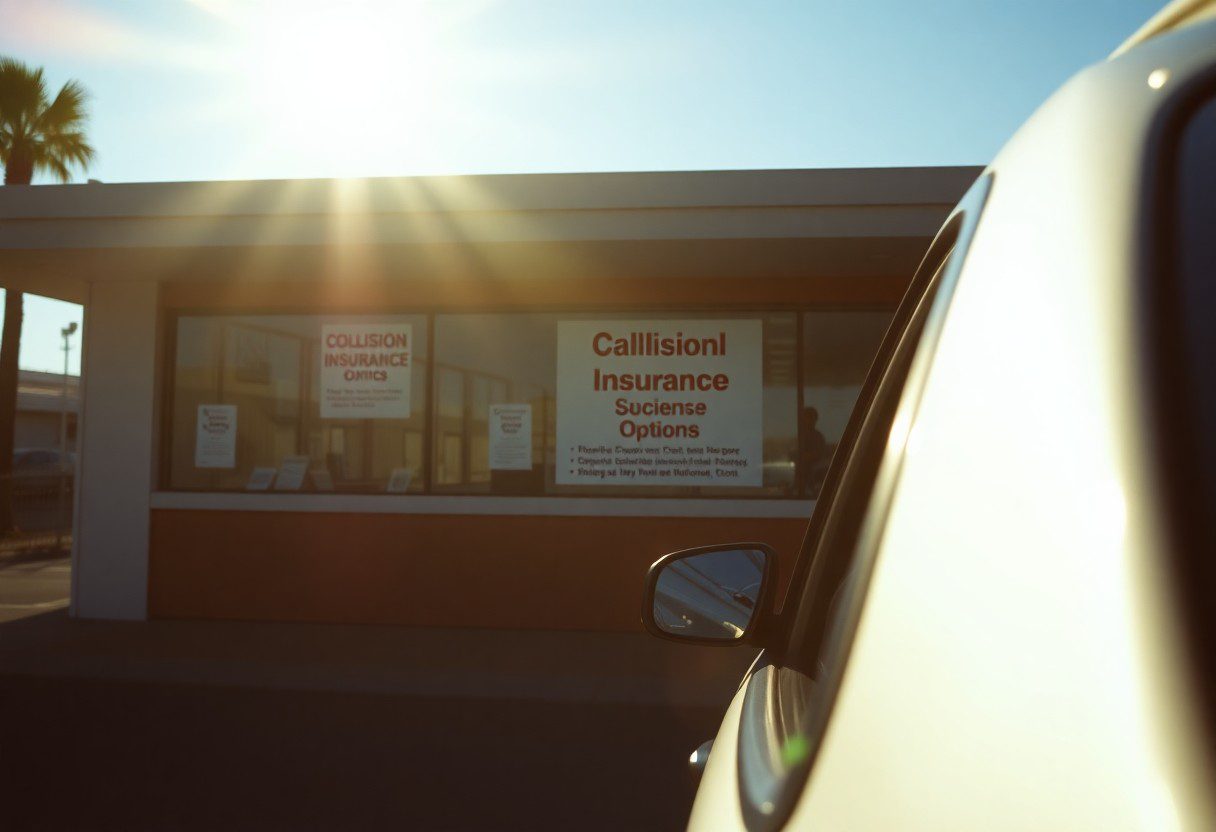Making decisions about collision insurance when renting a car can often leave you feeling overwhelmed and unsure about the best option for your needs. Before embarking on your next car rental journey, it is essential to assess whether your existing coverage is adequate to protect you against any potential issues. Your personal auto insurance policy and credit card benefits may already provide you with substantial protection against damages to rental vehicles. However, if you do not own a vehicle or if your insurance coverage is limited, you could be placing yourself at risk of considerable financial liabilities without additional protection. By carefully reviewing your current insurance policy and credit card benefits, you can make an informed choice that not only saves you money but also ensures that you are fully protected throughout your rental experience.

Conduct a Comprehensive Review of Your Current Insurance Coverage for Rental Cars
To make an informed decision regarding rental car insurance, it’s crucial to engage in a thorough examination of your existing coverage options. A meticulous analysis of your current insurance can potentially save you between $140 and $280 on a weekly rental by avoiding unnecessary overlapping insurance policies. Understanding what your insurance covers before you rent can provide peace of mind and significantly reduce unexpected expenses, allowing you to allocate your budget towards a more enjoyable travel experience. This proactive strategy not only enhances your financial planning but also contributes to a more enjoyable journey, knowing that you are adequately protected against potential risks.
Investigate the Details of Your Personal Auto Insurance Policy for Rental Coverage
In addition to scrutinizing your personal auto policy, it is vital to determine if your current insurance includes comprehensive and collision coverage for rental vehicles. Generally, the deductible associated with your personal insurance will apply to rentals as well. Therefore, it is advisable to reach out to your insurance provider to confirm whether your policy also covers Loss of Use and Diminution of Value claims related to rental vehicles. Taking this proactive measure can help you avoid unexpected costs and ensure that you have adequate protection while driving a rental car, allowing you to enjoy your travels without the constant worry of potential financial setbacks.
Enhance Your Awareness of Credit Card Benefits for Rental Coverage
Credit cards can offer primary or secondary collision coverage for rental vehicles, making it essential to understand the specific benefits your card provides. Most premium credit cards will provide rental car protection if you use the card to pay for the full rental cost. Coverage periods typically range from 15 to 31 days, depending on the card issuer. Being aware of these details can help you make a more informed decision and potentially reduce your expenses on rental insurance. Furthermore, understanding the intricacies of your credit card benefits can empower you to navigate rental agreements confidently and effectively, ensuring that you maximize your financial resources.
Delving deeper into the specifics of credit card protection reveals certain limitations you should be aware of. Your coverage might exclude specific vehicle types, such as luxury cars or oversized SUVs. Additionally, you must decline the rental company’s collision damage waiver to activate your credit card coverage. Some credit cards also have stipulations requiring you to notify them prior to the rental period to ensure coverage is valid. Therefore, conducting thorough research on the terms of your credit card can significantly enhance your rental experience and overall financial security.

Comprehend the Financial Consequences of Your Rental Car Insurance Choices
Your choices regarding rental car insurance can have a profound impact on your finances. While the daily cost for a collision damage waiver (CDW) typically ranges between $20 and $30 per day, it's crucial to recognize that your existing auto insurance or credit card benefits may already provide complementary coverage at no additional cost. Understanding these various costs and benefits equips you to make a financially prudent decision that aligns with your needs. By analyzing your options carefully, you can keep your travel expenses manageable while still enjoying adequate protection during your rental period.
Conduct a Comparative Cost Analysis of Rental Insurance Options
| Rental Counter CDW | $20-30/day |
| Credit Card Coverage | $0 (included) |
| Personal Auto Insurance | $0 (included) |
By assessing the costs associated with various rental insurance options, it becomes apparent that you could save up to $210 over a week-long rental by opting to utilize your existing coverage instead of purchasing additional insurance at the rental counter. This insight can help you make more economical choices while traveling, ensuring that your budget is allocated more efficiently towards experiences that genuinely enrich your journey rather than unnecessary insurance expenses.
Identify Hidden Fees and Extra Charges in Rental Agreements
In addition to your basic rental rate, companies frequently impose unexpected charges, such as loss-of-use fees, administrative fees, and diminished value charges. These additional costs can inflate your total expenses by as much as 30-50% if you lack the proper coverage. Therefore, it is crucial to thoroughly review your current insurance policy and credit card benefits. Pay particular attention to coverage for loss-of-use fees, as many basic policies may not include these important protections. Having a credit card that offers primary coverage can shield you from the burden of paying deductibles or risking insurance premium increases, making it a wise choice for frequent renters.
Recognize Potential Risks Involved in Vehicle Rentals
Even the most cautious drivers face potential risks when renting vehicles, and understanding these risks is essential for making informed insurance decisions. Your exposure may encompass various scenarios such as:
- accidents occurring in unfamiliar locations
- theft or vandalism of the rental car
- damage due to weather-related incidents
- incidents occurring in parking lots
By recognizing these risks, you can evaluate your need for additional insurance coverage when renting a vehicle, ensuring that you are prepared for any eventuality. Taking proactive measures to address these risks can greatly enhance your peace of mind and contribute to a smooth rental experience.
Special Considerations for International Rentals: Insurance Essentials
When it comes to international car rentals, additional precautions are necessary. Your standard insurance and credit card benefits may not apply when driving in foreign countries. Statistics indicate that 85% of U.S. auto policies do not extend coverage to international rentals, making it critical to consider supplementary insurance for overseas travel. This proactive approach can help reduce potential financial risks and ensure peace of mind while exploring new destinations. By understanding the nuances of international travel insurance, you can navigate your rental experience with confidence, avoiding potential pitfalls associated with inadequate coverage.
Understanding the Implications of Vehicle Type on Insurance Coverage
Before finalizing your choice of rental vehicle, it is crucial to acknowledge that luxury cars and specialized vehicles often require additional insurance coverage. Many standard policies impose limits on protection for conventional vehicles, leaving premium models and larger vehicles susceptible to coverage gaps. Furthermore, data suggests that SUVs and luxury vehicles incur a 40% higher repair cost compared to standard cars, which can pose significant financial risks if you lack adequate coverage. Basic insurance policies may cap coverage at a value of $50,000, meaning you could face considerable out-of-pocket expenses if you damage a high-value rental without the appropriate protection. Therefore, understanding the impact of your vehicle choice on insurance needs is essential for responsible budgeting.
Adjusting Your Insurance Requirements According to Unique Circumstances
It’s important to recognize that your insurance requirements can fluctuate based on specific circumstances and locations. Your standard coverage may not be applicable when renting in certain countries, during natural disasters, or for specialized vehicles such as luxury cars or large vans. International rentals typically necessitate additional coverage, as standard insurance policies often do not extend beyond domestic borders. This variance emphasizes the necessity for thorough research and preparation to ensure you are adequately protected, regardless of your rental situation.
Distinguishing Coverage Differences Between Business and Personal Rentals
To ensure that you are sufficiently protected, it is essential to understand that business and personal rentals come with different insurance requirements. Your personal auto insurance may not cover business-related rentals, and your employer’s insurance might not extend to personal use. Industry data indicates that 85% of business travelers require separate coverage when their travel mixes both business and personal purposes, highlighting the importance of clarity in understanding your insurance needs. Recognizing these distinctions can help prevent potential financial pitfalls, ensuring that you are adequately covered for all types of rentals.
Understanding How Payment Methods Affect Rental Coverage
When it comes to rental car insurance, business credit cards often provide different coverage levels compared to personal cards. It is crucial to verify whether your card offers primary or secondary coverage, as this distinction can significantly impact your claims process and any potential out-of-pocket expenses. Primary coverage can exempt you from needing to file claims with your personal insurance, which can save you valuable time and effort in the event of an incident. Understanding these nuances can empower you to make informed decisions when renting a vehicle.
In addition to standard coverage concerns, the payment method can also influence deductibles and coverage limits. Premium credit cards frequently offer collision coverage limits up to $75,000, whereas basic cards may restrict coverage to $30,000. Be advised that using debit cards typically provides no coverage and may require additional security deposits, complicating the rental process. Being informed about these details can help you navigate the rental process more effectively and avoid unnecessary complications.

Assess How Rental Duration Influences Your Insurance Decisions
Your decisions regarding rental car insurance often hinge on your rental duration and travel frequency. Both your personal auto insurance and credit card coverage usually come with specific time limitations regarding rental protection. It’s essential to evaluate your coverage needs differently for short weekend trips compared to longer month-long rentals to ensure you have the appropriate level of protection. This evaluation helps minimize unforeseen costs and guarantees that you remain adequately covered throughout your travel period.
Considerations for Short-Term Rentals: Optimizing Your Coverage
Approximately 80% of rental car bookings are for less than five days, making it essential to understand your options for these brief rentals. Typically, your credit card’s collision coverage will provide sufficient protection for these shorter rental periods. Most credit cards offer 15-day coverage when rentals occur within your home country, and 31 days for international rentals, ensuring you have the necessary protection for shorter trips. Grasping this can help streamline your rental experience and allow you to focus on enjoying your travels without unnecessary worry.
Addressing Insurance Gaps for Extended Rental Periods
For longer rental durations, insurance gaps become increasingly prevalent. Standard credit card protection often expires after 15 to 31 days, which can leave you vulnerable during extended rentals. Similarly, standard auto policies frequently limit rental coverage to 30 consecutive days, making it vital to consider additional insurance if your rental exceeds this timeframe. Furthermore, extended rentals come with increased risks of damage, as the longer you have the vehicle, the more exposure it faces. If your rental extends beyond the primary coverage period, securing supplemental insurance is a prudent choice. Reports indicate that accident rates escalate by 32% for rentals lasting more than three weeks, underscoring the importance of adequate protection during extended rentals.
Strategic Approaches to Making Informed Insurance Decisions
Ultimately, all insurance decisions should be tailored to your unique situation. Your goal is to strike the right balance between adequate protection and cost-effective coverage. Research shows that 65% of renters end up overpaying for insurance they do not need, while a concerning 20% remain dangerously underinsured. Achieving this balance is crucial for effective financial planning while traveling, ensuring that you maximize your resources while minimizing potential risks.
Utilize This Comprehensive Decision-Making Checklist for Rentals
Making the right choice becomes straightforward when you follow these steps: First, check your current car insurance policy for coverage details. Next, verify your credit card benefits to comprehend what is included. Finally, calculate the potential costs associated with your rental. If you possess comprehensive coverage on your personal vehicle and a credit card that offers primary rental coverage, you can confidently decline any additional insurance offered at the rental counter. This thorough approach ensures that you remain informed and empowered during your rental experience.
Be Vigilant of Common Red Flags When Renting
Before signing any rental agreement, it's essential to look out for hidden fees, coverage gaps, and policy exclusions. Rental companies often use pressure tactics at the counter, suggesting that their insurance is mandatory when it may not be. Remaining vigilant can prevent you from incurring unnecessary costs. At the rental counter, stay alert to common issues that could arise, such as unauthorized charges, ambiguous policy terms, and exorbitant daily rates. Data shows that rental companies may charge up to $30 per day for collision coverage that you might already have through your credit card or personal auto policy, making it imperative to remain informed and cautious.
Essential Insights on Rental Car Insurance Decisions
Your decision regarding rental car collision insurance hinges on various factors, including your existing coverage and specific circumstances. If you possess personal auto insurance with comprehensive coverage or utilize a credit card that provides primary rental coverage, you can opt out of the extra insurance offered at the counter. Conversely, if you do not own a car, lack sufficient coverage, or plan to rent luxury vehicles, securing supplemental insurance is advisable. Before declining coverage at the rental counter, ensure you thoroughly review your current policies and understand their limits. This simple yet vital step can lead to significant savings and protect you from unnecessary expenses during your rental experience.
Addressing Common Inquiries About Rental Car Insurance
Q: Will my personal car insurance cover rental vehicles?
A: Most personal car insurance policies extend coverage to rental cars provided you have collision and comprehensive coverage. It’s crucial to contact your insurance provider to confirm the specifics of your coverage, including limits and any restrictions on particular vehicle types. Additionally, be aware that filing a claim for rental car damage may lead to increased insurance rates. Understanding these nuances can help you navigate your rental experience with confidence.
Q: How does credit card rental car coverage function?
A: Credit cards can provide primary rental car collision coverage when the card is used to cover the full rental cost. This coverage comes into effect when you decline the rental company’s collision damage waiver. Generally, this protection includes damage and theft coverage, but terms can vary significantly by card. Some cards may limit coverage to 15-30 days and exclude luxury vehicles or rentals in certain countries. Being well-informed about your credit card’s policy can help you make better choices when renting a vehicle.
Q: In which situations should I consider purchasing extra collision insurance from the rental company?
A: You should consider buying extra collision insurance if you fit into any of the following categories: you don’t own a car, you lack personal auto insurance, you are renting with a debit card, you’re using points for payment, you’re renting luxury vehicles, or your rental duration exceeds your credit card’s coverage period. For international rentals and those who wish to avoid using personal insurance, additional coverage is also advisable. The average cost is around $20 per day in most states, making it an important consideration for your travel plans.
The Article: Do You Really Need Extra Collision Insurance for Your Car Rental? appeared first on https://rentacar24.org/
The Article Extra Collision Insurance for Your Car Rental: Is It Necessary? Was Found On https://limitsofstrategy.com
The Article Is Extra Collision Insurance Necessary for Car Rentals? First Appeared ON
: https://ad4sc.com





Comments are closed